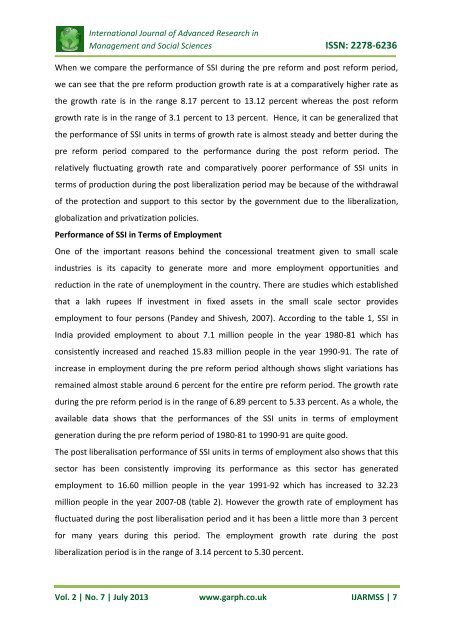ISSN: 2278-6236 INTRODUCTION GLOBALISATION AND SMALL SCALE INDUSTRIES IN INDIA
You also want an ePaper? Increase the reach of your titles
YUMPU automatically turns print PDFs into web optimized ePapers that Google loves.
International Journal of Advanced Research in<br />
Management and Social Sciences <strong>ISSN</strong>: <strong>2278</strong>-<strong>6236</strong><br />
When we compare the performance of SSI during the pre reform and post reform period,<br />
we can see that the pre reform production growth rate is at a comparatively higher rate as<br />
the growth rate is in the range 8.17 percent to 13.12 percent whereas the post reform<br />
growth rate is in the range of 3.1 percent to 13 percent. Hence, it can be generalized that<br />
the performance of SSI units in terms of growth rate is almost steady and better during the<br />
pre reform period compared to the performance during the post reform period. The<br />
relatively fluctuating growth rate and comparatively poorer performance of SSI units in<br />
terms of production during the post liberalization period may be because of the withdrawal<br />
of the protection and support to this sector by the government due to the liberalization,<br />
globalization and privatization policies.<br />
Performance of SSI in Terms of Employment<br />
One of the important reasons behind the concessional treatment given to small scale<br />
industries is its capacity to generate more and more employment opportunities and<br />
reduction in the rate of unemployment in the country. There are studies which established<br />
that a lakh rupees lf investment in fixed assets in the small scale sector provides<br />
employment to four persons (Pandey and Shivesh, 2007). According to the table 1, SSI in<br />
India provided employment to about 7.1 million people in the year 1980-81 which has<br />
consistently increased and reached 15.83 million people in the year 1990-91. The rate of<br />
increase in employment during the pre reform period although shows slight variations has<br />
remained almost stable around 6 percent for the entire pre reform period. The growth rate<br />
during the pre reform period is in the range of 6.89 percent to 5.33 percent. As a whole, the<br />
available data shows that the performances of the SSI units in terms of employment<br />
generation during the pre reform period of 1980-81 to 1990-91 are quite good.<br />
The post liberalisation performance of SSI units in terms of employment also shows that this<br />
sector has been consistently improving its performance as this sector has generated<br />
employment to 16.60 million people in the year 1991-92 which has increased to 32.23<br />
million people in the year 2007-08 (table 2). However the growth rate of employment has<br />
fluctuated during the post liberalisation period and it has been a little more than 3 percent<br />
for many years during this period. The employment growth rate during the post<br />
liberalization period is in the range of 3.14 percent to 5.30 percent.<br />
Vol. 2 | No. 7 | July 2013 www.garph.co.uk IJARMSS | 7


